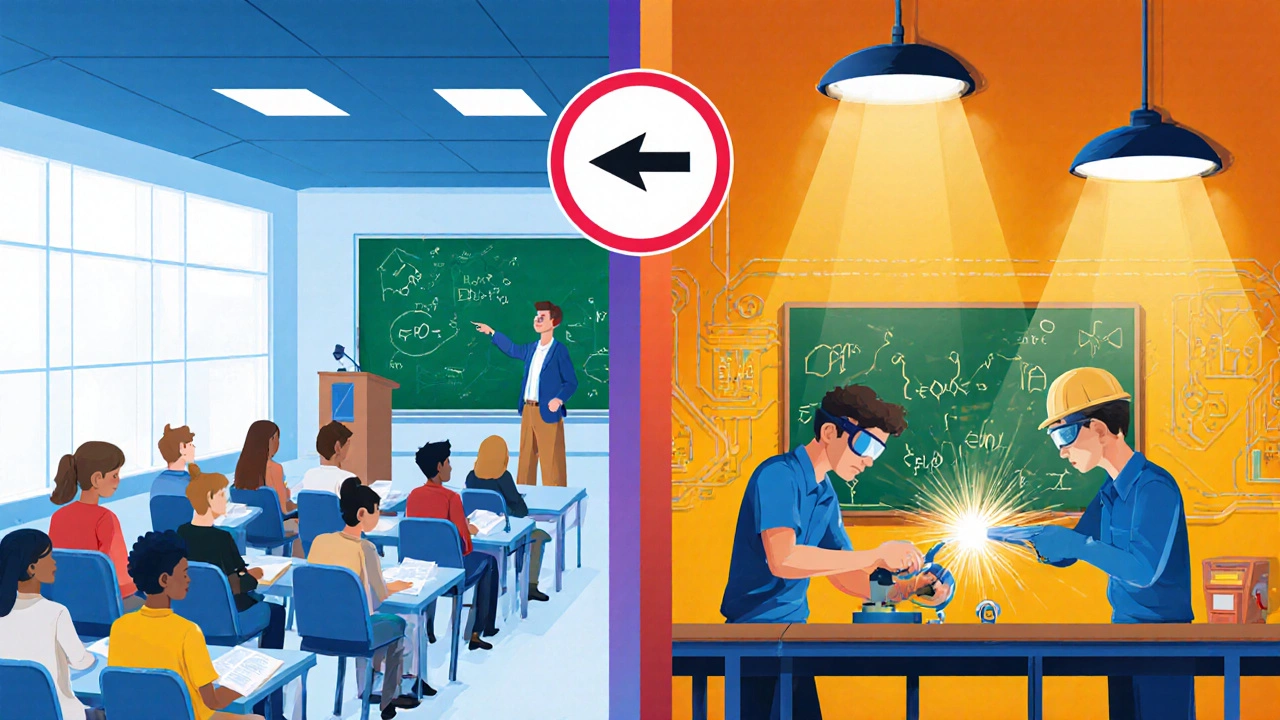College vs Vocational Training Decision Tool
College Education
- Broader academic knowledge
- 4-year degree programs
- Higher tuition costs
- Stronger for graduate studies
- Extensive alumni networks
Vocational Training
- Technical job-specific skills
- Shorter training duration
- Lower costs
- Fast entry into workforce
- Industry-aligned curricula
Your Recommended Path
Trying to pick the right post‑secondary route feels a lot like standing at a crossroads without a sign. Do you enroll in a college education and chase a degree, or jump straight into a vocational program that promises hands‑on skills? The answer isn’t one‑size‑fits‑all, but understanding the core differences can steer you toward the path that lines up with your goals, budget, and learning style.
Key Takeaways
- College education typically offers broader academic knowledge and longer study periods, while vocational training focuses on specific job skills in a shorter timeframe.
- Costs vary widely: college tuition is usually higher, but financial aid options are extensive; vocational programs tend to be cheaper but may have limited scholarships.
- Credential types differ-degrees versus certificates or diplomas-and each carries distinct weight in the job market.
- Learning style matters: colleges emphasize theory and research; vocational schools prioritize practical, on‑the‑job training.
- Your career timeline and earnings potential can be mapped using a simple decision checklist.
Understanding College Education
When you hear college education is a post‑secondary academic pathway that typically awards associate or bachelor’s degrees after a study period of two to four years, you probably picture lecture halls, research papers, and a campus vibe. The main credential here is a degree program an organized series of courses that culminates in an associate, bachelor's, or higher‑level degree. These programs aim to develop both subject‑matter expertise and critical thinking, often preparing graduates for a wide range of professions or further study.
College campuses usually offer a mix of core general‑education classes (like math, writing, and humanities) and majors that dive deep into a specific discipline-think engineering, psychology, or business. This breadth can be a double‑edged sword: it broadens horizons but may extend the time before you land a paycheck.
Accreditation plays a big role. A college must be recognized by a regional or national accrediting body, ensuring that credits transfer and employers trust the degree’s quality. In the U.S., organizations like the Middle States Commission on Higher Education or the Accrediting Council for Independent Colleges and Schools (ACICS) handle this.
Financially, college tuition averages around $10,000‑$15,000 per year for public institutions and $30,000‑$45,000 for private ones, according to recent data from the National Center for Education Statistics. However, scholarships, grants, and federal aid can offset a sizable chunk of that bill.

Understanding Vocational Training
On the other side of the fence sits vocational training a career‑focused education model that teaches specific technical skills for a particular trade or industry, often through short‑term courses, certificates, or apprenticeships. Instead of a four‑year degree, you’ll earn a certificate program a concise credential that verifies proficiency in a focused skill set, usually completed within a few months to two years or a diploma a formal document awarded after completing a vocational curriculum, often emphasizing practical skill acquisition.
Vocational schools, community colleges, and trade unions run these programs. They’re designed around hands‑on learning: labs, workshops, and real‑world projects dominate the schedule. An apprenticeship, for example, pairs you with an experienced mentor while you earn a wage-think electrician apprenticeships that last 3‑5 years.
Skill focus tends toward the technical: plumbing, welding, graphic design, medical assisting, or IT support. These “hard” skills translate quickly into entry‑level jobs that often don’t require a four‑year degree.
Cost is a major lure. Tuition for a certificate can range from $1,000 to $8,000, dramatically lower than most college bills. Some programs even offer tuition‑free options through government‑backed initiatives, especially in high‑demand fields like cybersecurity.
Accreditation still matters, but the bodies differ. The Accrediting Commission of Career Schools and Colleges (ACCSC) and industry‑specific agencies certify many vocational programs, ensuring that employers recognize the credential.
Head‑to‑Head Comparison
| Aspect | College Education | Vocational Training |
|---|---|---|
| Typical Duration | 2‑4 years (full‑time) | 3 months‑2 years |
| Credential | Associate/Bachelor’s degree | Certificate, diploma, apprenticeship credential |
| Cost (U.S.) | $10k‑$45k per year | $1k‑$8k total |
| Learning Focus | Theory, critical thinking, research | Hands‑on technical skills |
| Typical Entry‑Level Jobs | Analyst, junior manager, researcher | Technician, tradesperson, support specialist |
| Earnings (first 5years) | $45k‑$80k avg. | $35k‑$60k avg. |
| Financial Aid Options | Federal grants, loans, scholarships | Limited scholarships, employer tuition assistance |
| Transferability | High - credits move between institutions | Low - credentials are industry‑specific |
Pros and Cons of Each Path
College Education
- Pros: Broad knowledge base, higher lifetime earning potential, stronger foundation for graduate studies, extensive alumni networks.
- Cons: Higher tuition, longer time before entering the workforce, possible student‑loan debt, sometimes less direct job relevance.
Vocational Training
- Pros: Fast entry into the job market, lower cost, curricula tailored to current industry needs, often includes job placement services.
- Cons: Narrower skill set, fewer opportunities for career change without additional training, credentials may not be universally recognized.
Decision Checklist - Which Path Fits You?
- Career Goal: Do you aim for a profession that requires a degree (e.g., engineering, teaching) or a trade‑specific role (e.g., electrician, dental hygienist)?
- Time Horizon: Can you spend 2‑4 years studying, or do you need to start earning sooner?
- Financial Situation: Are you comfortable taking on loans, or do you prefer minimal tuition expenses?
- Learning Preference: Do you thrive in lecture‑based environments or hands‑on workshops?
- Job Market Research: Check local demand for the occupation you’re eyeing. In New Zealand, for example, trades like carpentry and renewable‑energy technicians are booming, while data‑analytics degrees are in high demand in Auckland.
- Long‑Term Flexibility: Consider if you might want to pivot later. A degree often offers easier switches between fields.
Answering these questions honestly will give you a clearer picture of which education model aligns with your personal and professional priorities.
Frequently Asked Questions
Is a college degree always worth the cost?
It depends on the field and your career goals. In high‑earning sectors like tech, engineering, or finance, the salary boost often outweighs tuition. In trades where certification leads directly to employment, a degree may not add significant value.
Can I combine college and vocational studies?
Yes. Many community colleges offer associate degrees alongside certificate programs. This hybrid route lets you earn a degree while still gaining targeted technical skills.
What financial aid is available for vocational programs?
Some vocational schools qualify for federal Pell Grants and student loans, especially if they’re part of a community college. Additionally, industry scholarships, employer tuition reimbursement, and government‑funded upskilling schemes (like New Zealand’s Tertiary Education Commission subsidies) can help.
How does accreditation affect my job prospects?
Accreditation assures employers that the program meets established quality standards. A lack of proper accreditation can limit eligibility for professional licenses and make your credential less recognizable.
Which path leads to quicker promotions?
Vocational routes often fast‑track you into skilled positions where experience drives promotion. However, certain management tracks still favor degree holders. Your industry’s promotion ladder will dictate the best route.

